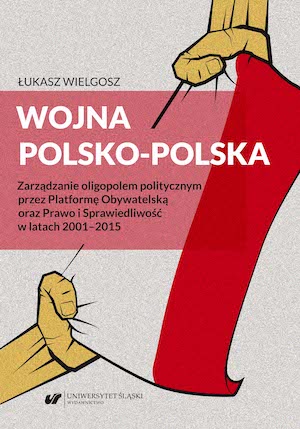Wojna polsko‑polska. Zarządzanie oligopolem politycznym przez Platformę Obywatelską oraz Prawo i Sprawiedliwość w latach 2001–2015
Polish‑Polish war. Managing the political oligopoly by the Civic Platform and Law and Justice parties in the years 2001–2015
Author(s): Łukasz Wielgosz
Subject(s): Politics / Political Sciences
Published by: Wydawnictwo Uniwersytetu Śląskiego
Summary/Abstract: The present monograph is devoted to the rivalry between two political parties, Civic Platform and Law and Justice from the moment of their formation until the parliamentary elections in 2015. The main research goal is to find the sources of the conflict, the causes of its escalation and the consequences of its persistence for both the parties involved, the party system and for the society. The attempt at describing this long‑lasting political process has raised several research questions and hypotheses accompanying the analysis of the course of the Polish‑Polish war. The first research question concerns the tools and methods used to control the course of political conflict in Poland. The accompanying research hypothesis assumes that the leaders of Civic Platform and Law and Justice have made use of the existing socio‑political divisions and created new significant ones, making ideological and agenda shifts, causing a sharp personal conflict and systematically adopting confrontational positions on “everyday problems”. The rivalry between Civic Platform and Law and Justice is beneficial for both sides – they have become such strong political entities that they have turned the market of political parties into an oligopoly. The second research problem is formulated around the following question: What interest did the Civic Platform and the Law and Justice parties have in dividing an initially homogeneous group of voters into two hostile groups? The research hypothesis related to this question assumes that the actions taken by both parties were the result of a well‑conceived strategy aimed at increasing the results of not only one party, but the entire pact thanks to mutual competition.The third research problem is connected with an attempt to identify the causes of the conflict and the point at which both sides considered that if they would “cooperate” with each other in a specific way, by fighting each other, they would share a common benefit (as in oligopoly). Probably, distinguishing the precise moment in the history will not be possible, as it could have taken several months to build up the consciousness under discussion. However, it is likely that the “logic of hostility” was born already at the time of the inter‑election tension (between the parliamentary elections and the second round of the presidential election) in 2005. The fourth research question is whether there has been any evolution in the agenda of Civic Platform and Law and Justice over the years as a mechanism for splitting the initially unified electoral group into two fighting blocks. A research hypothesis has been formulated around this research problem, assuming that Civic Platform has moved from the right side of the political scene towards the centre, while the Law and Justice party has made a move even further to the right, evolving from a centre‑right party to an ultra‑right party. The last research question is why such a sharp political dispute could have appeared in Poland. Are there any root causes of this phenomenon? The related hypothesis assumes that the cultural programming of the society and historical inclinations create favourable conditions for the emergence of this type of political conflict.The political oligopoly created by Civic Platform and Law and Justice is managed through a conflict that generates interest of the media and voters, and this has a direct impact on maintaining high support for the whole pact and on marginalizing other political entities.
- Page Count: 150
- Publication Year: 2019
- Language: Polish
- eBook-PDF
- Table of Content
- Introduction

